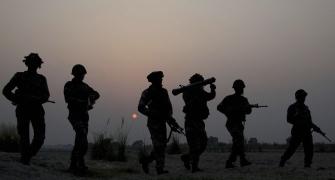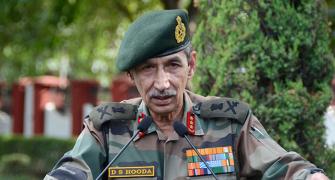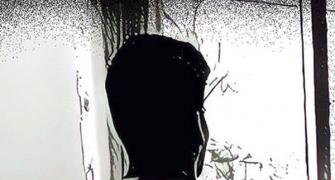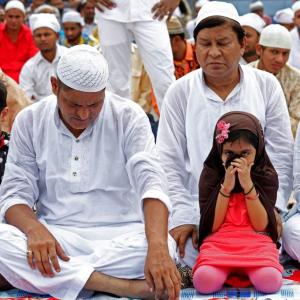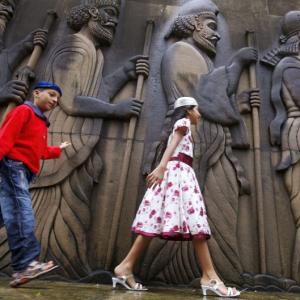These were videos of Sheena Bora's exhumation done by police belonging to Khar police station, northwest Mumbai, after receiving geographical details from Rai.
Her skeleton had been evidently exhumed once earlier in 2012 by the Pen police and returned, unidentified and anonymous, to its jungle resting place.
Three more years, unbelievably, passed before anyone came looking for it again.
Vaihayasi Pande Daniel reports from the Sheena Bora murder trial.
Illustration: Dominic Xavier/Rediff.com.
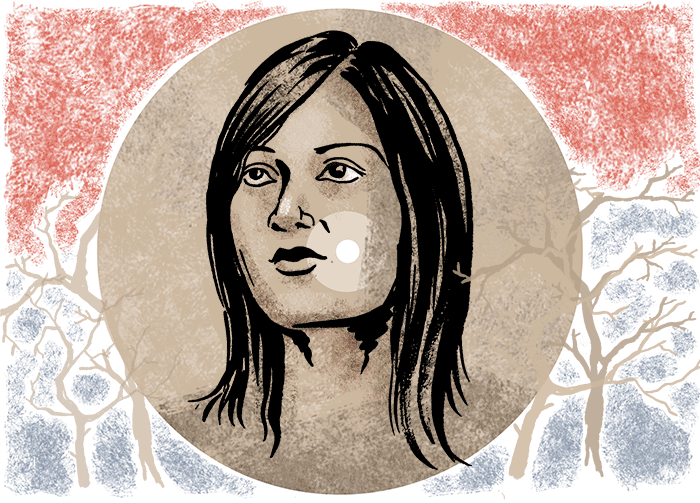
On a humid Tuesday afternoon, the lawyers of The State vs Indrani Mukerjea/Bora/Das/Pori and vs Pratim Mukerjea and vs Sanjeev Khanna trial symbolically journeyed back to where it all began.
To the thick jungles of Gagode Khurd, near Pen, Raigad district.
And the grave of the ill-fated Sheena Bora.
In the chambers of CBI Special Judge Jayendra Chandrasen Jagdale, before the court registrar and the court clerk, both defence and prosecution lawyers for all of the accused -- Gunjan Mangla, Sudeep Pasbola, Shrikant Shivade, Vishal Gupta, Shreyansh Mithare, Niranjan Mundargi, Bharat Badami and team -- viewed the eight videos and 60 photographs, taken by the police, of the exhumation of Sheena’s skeletal remains two years ago, in August 2015.
This was the compact disc that was meant to be viewed on Friday, September 22, along with the other CDs that came out of a parcel from the muddemaaal (safe court storage where trial exhibits are kept) but had been misplaced much to the frustration and mildly-expressed annoyance of the usually fiery Pasbola, Indrani Mukerjea’s counsel.
The CD turned up Tuesday in a brown packet, secured with government wax seals, apparently wrongly labeled as No 1 instead of No 15 on the muddemaal list.
Unlike the last hearing, there was – phew -- equipment on hand to view this disc. Pasbola and Mithare first called for the Apple laptop belonging to the cousin of Accused No 2 Sanjeev Khanna.
CBI prosecutor Badami strongly objected, growling. “(If it is) your personal laptop (it is okay). Don’t want from the accused side. Delete-welete ho jayega!”
So another laptop, belonging to one of the advocates, was immediately brought.
After viewing the CDs, ie, time traveling electronically to the site of the exhumation and examining the photographs (also of the disinterment), the lawyers, who now seemed a more solemn band of black, trooped back into sessions court’s No 51 where Judge Jagdale, witness-approver Shyamvar Pinturam Rai and the accused, Peter Mukerjea, Indrani and Sanjeev, in their rear enclosure, waited.
Pasbola told Judge Jagdale tersely: “Yes, we now have clarity (about the exhumation CD).” He said they had made copies of the videos on a pen drive and would distribute it among themselves and then asked for the prosecution to supply them with copies of the photographs, to which Badami assented without murmur.
Incidentally, these were videos of the exhumation done by police belonging to Khar police station, northwest Mumbai, after receiving geographical details from Rai.
The skeleton had been evidently exhumed once earlier in 2012 by the Pen police and returned, unidentified and anonymous, to its jungle resting place.
Three more years, unbelievably, passed before anyone came looking for it again.
Pasbola then turned the court’s attention back to the festering call data records (CDR) issue, which he had already spoken about just prior to the exhumation CD viewing. The defence had still not been able to procure copies of the phone records relating to a clutch of cell numbers belonging to ex-Mukerjea driver Rai, Indrani and Sanjeev Khanna.
In the last hearing it had been decided that Reliance and Airtel needed to issue affidavits justifying why they were unable to locate certain call records. Or else produce them. Till date their affidavits had not come in.
Pasbola, in a loud voice, and a tad angry, said at the start: “The CDRs are not only of 2012 but of even 2015. On basis of this we need to do the cross examination. (Otherwise) we are handicapped! It is all in the air.”
Jagdale tried to pacify Pasbola, but was also slightly irritated. “Nobody can anticipate the documents (which the defence might need in advance). We will try to get them because it is the requirement of law and the requirement of justice. But if it is not possible…”
Pasbola quickly tendered an apology for the short-notice requests, but then went right back to the thorny cell phone records problem.
Whenever Pasbola forcefully contradicts Jagdale, it is always a taut court moment, till the senior advocate in mollification adds more softly, “I will just tell you,” or “I will explain,” not letting go of his view, and the judge always willing to be persuaded.
Pasbola’s explanation was, “We need the CDR of his phone (indicating covertly he was talking about Rai, who was sitting in the corner seemingly oblivious). On the basis of this we can demolish his credibility. To whatever extent the court can help us. Why should I be deprived of it?”
Jagdale agreed with a considered, “That is there” and said they needed to seek a proper explanation from the telecom companies.
Peter’s lawyer Vishal Gupta, who works along with Shrikant Shivade (of Salman Khan trial fame), also got to his feet and explained that most cell companies meticulously stored the backup of cell records in “temperature-controlled room” so they were not affected or lost to mildew or mites.
Jagdale countered, “Technology has expanded at such a rate we don’t know the present procedure (for storing).”
Gupta persisted, “My understanding is that it is not destroyed.”
Mundargi, who represents Sanjeev Khanna and is a tall, boyish-looking trial lawyer, backed him up: “They have software that even makes deleted material retrievable…”
Gupta added that maintaining the call records “was a very important function of these companies.”
Pasbola, now appearing cross again, with the scowl of a grumpy bulldog on his face, said sternly: “(To keep it) for five years is the condition of their license. That’s the rule. No one can say they are not obeying it.”
Jagdale, positive but definite: “We will ask. I have asked him to give the reason. Excuses might be understandable or not. But cannot coerce a witness.”
Pasbola: “Beyond five years you cannot coerce… If something is in existence the court can call upon them.”
A discussion about the rights of telecom companies ensued and what had been the precedent in other cases where call records were the backbone and had been summoned. It is difficult to imagine how investigations could have even unfolded without this vital information in pre-cell eras, a time only a few in the room could have been familiar with.
Pasbola used that opportunity to mildly educate the judge about the perspective of defence lawyers on this. He went on to categorically state, darkly, that requests from defence lawyers were always treated differently by cell phone companies.
“It is seldom that they are impartial. Nodal officers are (often former) law enforcement officers and are totally under the thumb of law enforcement officers. They try to create hurdles.”
Jagdale attentively heard Pasbola’s contention. He did not comment and instead suggested they all convene again Wednesday to solve the call records issue and have the nodal officers back in court.
Indrani, still barefoot and fasting -- “Only four more days” -- colourful in red for the sixth day of Navratri, exited from the courtroom, to park herself on the bench outside in the corridor for conferrals with Pasbola and Mangla.
Sanjeev, who looked on Tuesday a bit like a forest ranger who had accidentally strayed into court, in his jaunty khaki kurta with epaulets worn with jeans, was beside her on the bench, going over papers with his cousin, Mundargi and Mithare.
Peter had his brother Gautam and wife Arti, to see him from Goa, after many months; they brought a large and enticing lunch dabba for him.
Earlier, before the hearing, Gautam, who probably last saw Peter in April, stood at the top of staircase on the third floor looking out the window, eagerly waiting for that first glimpse of his brother in the entryway below, as he alighted from the prison buses. Peter spying him from the ground floor gave a happy wave upwards.
One wondered what it would feel like to see your much-loved sibling moving towards you and then, maybe with a sinking heart, also noting the string of cops surrounding him. It would perhaps be an intensely bittersweet moment.
Post the hearing Peter and family sat chatting, until the process to herd the trio of accused back to the jail trucks below started up.
Indrani sat tight, cemented to the bench, as usual, not leaving till Peter also made motions to do so. Sanjeev, who seems to prefer to avoid confrontations, was already waiting downstairs with his escorts.
Badami, stood in the middle of the swirling crowd of relatives, lawyers and police escorts, like a cop who had lost control of the traffic. He muttered tetchily: Yeh jayenge toh woh jayegi (if he goes then she will go)?! Next time we will video conference them from the jail. Time pass karte hain!”
Exiting the Kala Ghoda court about half an hour after the accused in the Sheena Bora murder case, from the front entrance, was Lt Colonel Shrikant Prasad Purohit, who had recently got bail in the 2008 Malegaon blast case, after spending nine years in Taloja jail. A short man, with a smooth, important manner, he had three jeeps of security -- 8 to 9 jawans of the military police in fatigues from a Sikh regiment, as well 4 to 5 policemen -- awaiting him, ready to drive him to the nearby Colaba base.
Meanwhile, it was one of those days when court beat reporters found it difficult to decide which court to be at: At the Kila Court just 3.8 km away, near Chhatrapati Shivaji Maharaj Terminus, where the 990-page chargesheet, with statements from 182 witnesses including inmates, for the alleged murder in June of Byculla jail prisoner Manjula Shetye had been submitted before the magistrate.
Indrani's statement was part of that chargesheet. No doubt, if she had a choice she would not have known at which court to be Tuesday either, albeit barefoot.
Wednesday’s hearing, for which the Sheena Bora murder case accused were not required to show, instead produced Manoj Patil of Bharti Airtel and Rajesh Gaekwad of Reliance. Parenthetically, we noted, Patil refused to tell anyone his name (“Sorry, I cannot comment”)!
The Airtel nodal-officer-without-a-name was sitting outside the court, on a bench talking in low voices with the CBI team, when the matter came up.
The bench and counsels then awaited Pasbola’s arrival past 3 pm. The extra busy lawyer, who routinely appeared for umpteen cases across the Kala Ghoda sessions court on a daily basis, shot into Courtroom 51 at 3.25.
He and his assistants got down to examining and signing documents on green legal paper as Judge Jagdale patiently waited. The judge finally joked and asked in Marathi if they were still on this case or had moved on to another.
There were a bunch of laughs as Pasbola averred that the papers were for the Sheena Bora murder case.
Finally the document was presented to judge through the court clerk. It was a request for the call and SMS data records of two more cellphone numbers (of Vodafone and MTNL) and also for more detailed data with reference to Indrani and another of Rai’s numbers. It sought the GPS location of the closest towers in connection with calls placed.
Jagdale seemed a bit confused. Given there are so many cell phones and providers taking part in this case, who wouldn’t be? Pasbola took him through a small rewind: “These are of PW2 (prosecution witness 2, Shyamvar Rai). These are two other numbers of the approver. He said he was using up to 10 numbers. These numbers were being used by the witness at the time of the incident. ” Further they appeared in the records of the other accused.
A foggy Rai had told the baffled court mid-August, when asked how many phone numbers could he have had, was it three, four, five, six, 10: "I don't know how many numbers I had."
Pasbola then clarified their request for tower locations, saying that even if a mobile tower became inactive, its number remained sacrosanct and existed apparently in perpetuity and its coordinates would help with the movements of Accused No. 3, ie, Rai “My Lord, one can know his location and the time he has been at a particular place,” he said.
Badami began grumbling, “This is an absolutely new request!” indicating that the defence was being tiresome and unfair in badgering the prosecution with continuous demands.
Pasbola was stout in his denial. He said that the existence of these new numbers and his mysterious tendency to collect SIMs had just come to be known during the recent cross examination of the driver.
Further, Rai had told the court a month ago or so how he had visited a certain Mr Machado in Andheri to deliver a letter for Indrani in 2012 and the recipient had made Rai write down his name, cell number and address. “This is the number (lo, a new one!) he writes on that letter in his handwriting.”
The Airtel nodal officer Patil then took the witness stand and did a reprisal of his unhelpful performance of Friday, offering a litany of excuses on why the call records were still not accessible, ranging from needing time, to the company having a new IT man. He argued too that the cell phone number, for which the defence was looking for records of, had two owners at different periods and was also unused for a period of one year.
Patil: “Between January 1, 2012, and August 31, 2015, it had two owners.”
Pasbola sharply, more impolite with him than he is with anyone: “You are not concerned with owners.”
Patil: “Please understand…”
Pasbola loudly, firmly: “Please understand!”
Jagdale then intervened, clucking and told Pasbola, “He is right.”
There was a moment of tension as Pasbola disagreed. He insisted to Jagdale that the Airtel officer was wrong and he would show why.
Even as Patil mumbled on incessantly about needing “specifics,” Pasbola rudely cut him short saying that the cellphone company should only concern themselves with producing the call activity relating to a certain period and not the owners, and that while taking a cellphone SIM any name could have been put down.
Jagdale interjected asking about the illegalities. Pasbola countered, “That is illegality!” indicating too the importance of obtaining the records of a period and not a person because at this point, he said very pointedly, he could not reveal the names of the persons associated with the cell numbers.
Understanding what Pasbola was alluding to, Jagdale attempted to pin down Patil as to when he would produce the records. Patil prevaricated and asked for a week at least, saying it would take time to search the tape records. He is due yet another trip to the court Thursday.
The Reliance representative Rajesh Gaekwad showed up, without an affidavit and instead with a statement from his company that by government orders he was not required to keep the records, displeasuring Jagdale. Pasbola said he would file a rejoinder to the statement from Reliance and ask again for the affidavit.
Wednesday’s day in court ended with a yet another par-for-the-course lively spat between Pasbola and Badami about the date for the next hearing.
Badami, still bugged over Pasbola’s last minute fresh request for call records of yet more numbers, asked him, “Are you going to cross examine (Thursday) or what are you going to do?” tossing his hands in the air, as if there was no telling what Pasbola’s next strange antic would be.
Pasbola, smiled, baring his teeth and said emphatically: “I am going to cross examine.”
Badami going back to the issue gnawing at him sorely, “He gave this application one hour before…!”
Jagdale attempting to bring peace and calm the waters, offered to Pasbola, “What he is saying is that next time don’t give him a surprise!”
Badami, pulling a sad forlorn face: “We (the prosecution) have no rights” but then added bravely, with gusto, but still dejected, “The prosecution has to stand on their own strong legs!”

